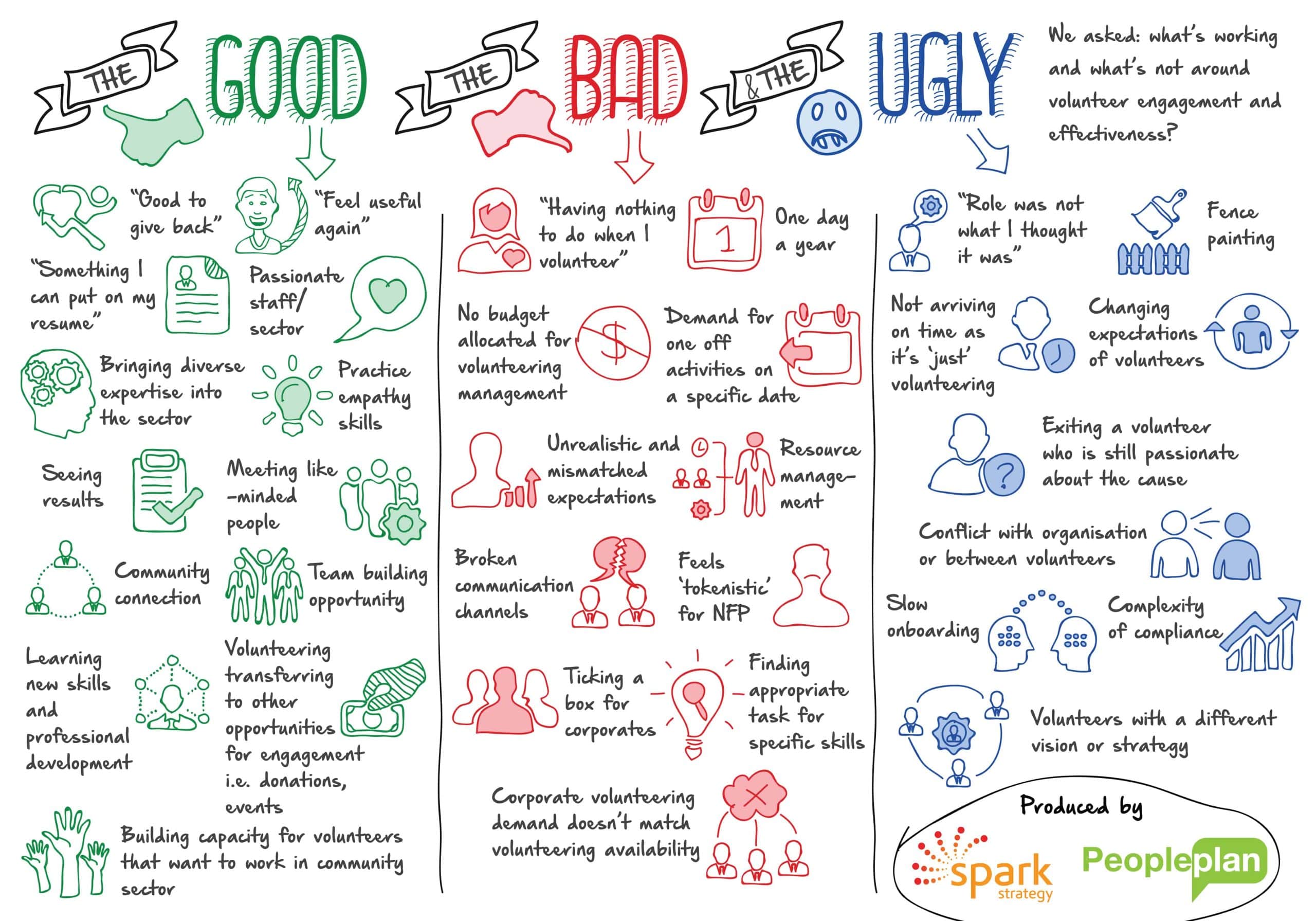Every year 1 in 4 Australians volunteer for a NFP. Collectively, they make a huge contribution to the sector, however volunteering can also be a risk to the organisation due to the time and cost spent managing volunteers effectively.Conversely, volunteers are sometimes left feeling underwhelmed at the experience.
So, how do we accelerate and increase the engagement and effectiveness of volunteering in Australia?
Spark Strategy recently led a workshop with online learning and communications company Peopleplan to answer just this.
Taking a design-thinking approach to reframe the future of volunteering, teams were formed around three personas – youth, corporate and older volunteers.
Participants attended from a range of organisations including the Australian Red Cross, The Smith Family, FoodBank, Surf Lifesaving Australia, Australian Museum, Legacy along with corporates IAG, Commonwealth Bank and host Atlassian.
The group worked through a series of design-thinking activities, including persona mapping and user journeys, identifying and prioritising break points and developing solutions to the break points that would make the most impact if fixed.
Volunteers are the life and soul of the social sector. Here are the top seven ideas that were uncovered to help improve volunteering engagement and effectiveness.
Youth volunteering
Mismatched expectations of youth volunteers are a key reason for disengagement. Young people have an expectation they can “change the world” and then they are put to work handing out food trays or painting a fence.
- One idea to change that centred around a school campaign which aimed to make volunteering a part of everyday life for all youth, as well providing a realistic picture of what volunteering looks like and how even small actions can help an organisation achieve its goals.
- Another team called for a volunteering “rebrand” – that we need to make it more visible and desirable for youth to participate, even a reality TV style show was suggested. Who has a contact at The Gruen Transfer?
Corporate volunteering
With three teams working on corporate volunteering and voices present from both NFP and corporate sides, the discussion around what was working and what wasn’t was robust.
- Ideas to address breakpoints around lack of time and permission to volunteer included a professional development program which includes volunteering, linking corporate incentive rewards and incentive programs with a volunteering category, co-designed volunteer programs and projects and a top down strategy which targets senior leaders into volunteer roles as part of leadership development.
- Other key discussion included reflecting on the alignment of Not for Profits and corporates who partner with each other and the importance of connecting corporate employees with an NFP cause outside of volunteering activity.
Older volunteers
The breakpoints for older volunteers were largely focused on awareness and communications.
- One idea was to run volunteering awareness within transition to retirement programs at large corporates – positioning volunteering as an “encore career”.
- Another idea was a buddy system for volunteers with the objective of keeping each other actively engaged and possibly even pairing a more experienced volunteer with a first timer.
- The need for technology upskilling as part of the onboarding process was seen as very important.
With one in four Australians investing their time in volunteering, we need to also invest in the learning and development of these individuals so they can be more engaged and effective. We can see from this workshop that this looks different at each of stage of people’s lives.
With this scale of volunteering there is no doubt that technology is being underused as a tool to engage and produce more social impact.
To learn more about developing better corporate and not-for-profit partnerships, download our whitepaper, Partnering for Purpose.
This article was originally published on Probono Australia. You can view it here.
Co-author, Margaret O’Brien is the head of Not for Profit at Peopleplan, an online learning and communications organisation. She is also co-founder of the social enterprise Young Change Agents.


0 Comments